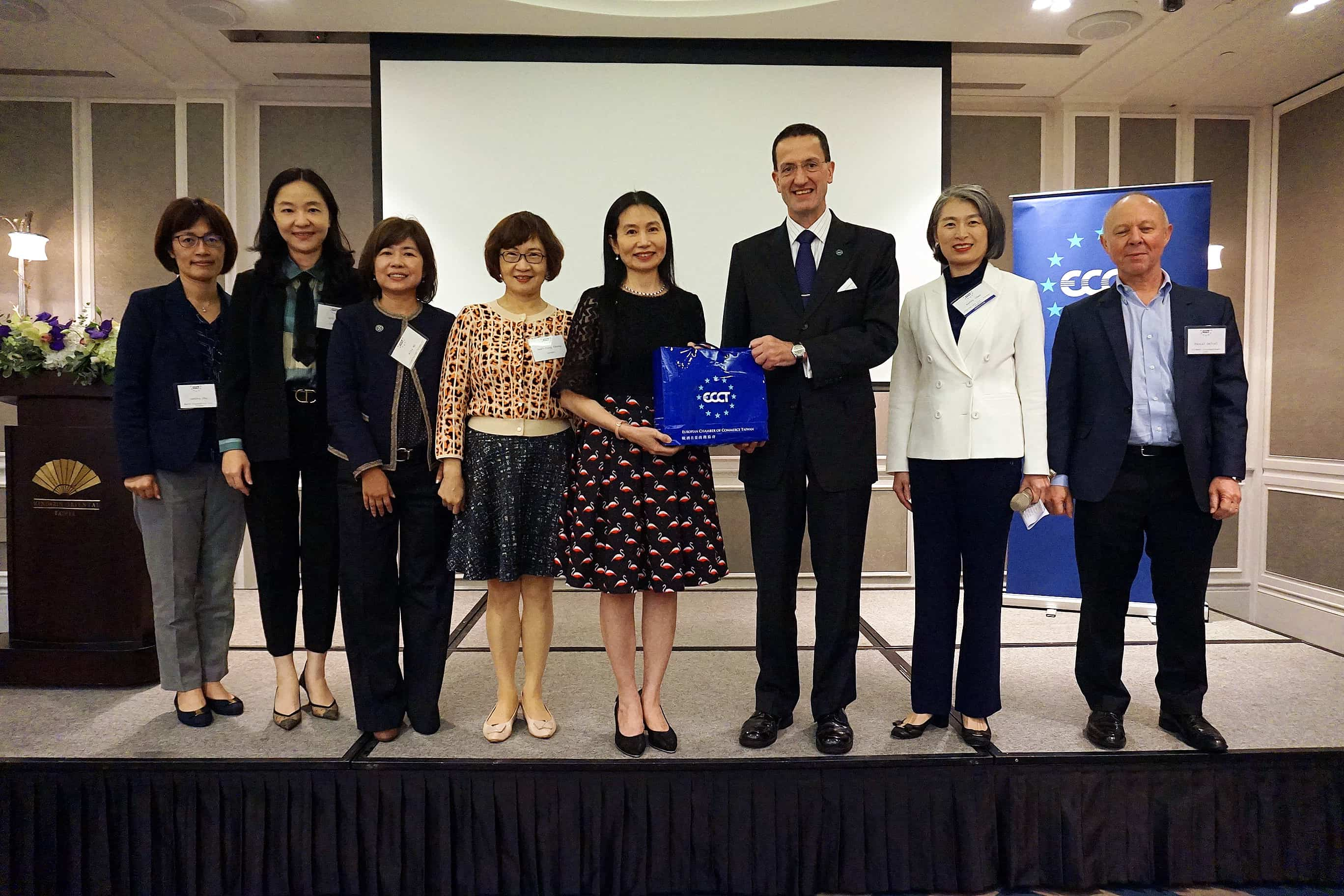Lunch with the FDA Director-General

The ECCT arranged a Premium Event lunch with the Taiwan Food and Drug Administration (FDA), under the Ministry of Health & Welfare (MOHW) on the topic "FDA reform outlook for food, pharmaceuticals, medical devices, and cosmetics". At the event Deputy FDA Director-General, Dr Cheng Hwei-fang, gave a short presentation, after which she and FDA Director-General, Dr Wu Shou-mei, together with other senior FDA officials, participated in a Q&A session, which lasted for well over the allotted 30 minutes that was scheduled.
Other officials attending and participating in the Q&A session were Dr Chen Wei-chih, Deputy Director, Division of Food Safety; Lin Chien-liang, Director, Division of Medicinal Products; Tu Pei-weng, Director, Division of Medical Devices and Cosmetics; Chih Lan-hui (Catherine), Director, Division of Quality Compliance and Management; Hsu Chao-kai, Director, Division of Planning and Research Development and Lin Hsu-yang Lin, Deputy Director, Northern Center.
In her presentation, Dr Cheng began by outlining policy priorities related to medical devices. This included the implementation of supporting regulations for the Medical Device Act, optimising the review process and developing regulatory practices for emerging medical devices and building a platform of an e-clinical trial management system. In terms of post market control, the priority is to establish mechanisms to regulate the source and flow of medical devices. In terms of device management, the FDA plans to promote a Unique Device Identification (UDI) system. The FDA also aims to improve international cooperation by participating in international organisations and establishing bilateral agreements.
Regarding the enforcement of the Cosmetic Hygiene and Safety Act, starting on 21 July 2021, non-pharmaceutical toothpaste and mouthwash products will be included under cosmetics regulations and there will be new labelling requirements for cosmetics products. We are currently in the transition phase from the current premarket approval system to a notification system which, will be phased in depending on the type of product, starting with specific purpose cosmetics on 1 July 2024, general cosmetics for infants, lips, eye use, toothpaste and mouthwash by 1 July 2025 and all other general cosmetics by 1 July 2026.
In terms of pharmaceuticals, Dr Cheng mentioned some policy proposals related to promoting cell and gene therapy. This includes a draft of the Regenerative Medicinal Product Act, Guidance for Bridging Medical Technique to Medicinal Products and Regulation Governing the Application of Specific Medical Examination Technique and Medical Device. The FDA provided guidance for applying for clinical trials of cell and gene medicinal products in May and November 2020, and management and traceability in June 2020. According to Dr Cheng, 68 cell and 13 gene therapy treatments have been approved. Dr Cheng went on to outline guidance for Real World Data/Evidence (RWD/RWE).
To enhance the efficiency of clinical trials, Multi-Regional Clinical Trial (MRCT) cases have been required to be submitted using an electronic platform for review and submissions since 1 September 2020.
Regarding Covid-19 vaccines, three vaccine candidates being developed in Taiwan have received approval for phase one trials while Remdesivir was approved as a therapeutic for use by Covid-19 patients in June 2020.
Dr Cheng went on to give an overview on food safety regulations and some recent updates, including regulations for bulk labelling (which needs to include all ingredients) as well as labelling regulations on the country of origin for packaged products that contain pork and other edible pig parts, that will be mandatory starting on 1 January 2021 for all packaged products as well as in restaurants.
New regulations on traceability, which came into force on 1 January 2020, require all food businesses to keep source documents for at least five years.
Dr Cheng concluded with an update on the status of which European countries had passed inspections to allow them to export meat and dairy products to Taiwan. Although all EU member states follow the same health and safety regulations, Taiwan does not currently accept the EU’s food control procedures and implementation systems. For example, pork and poultry from France may be exported to Taiwan but the application for beef is still pending. Meanwhile, beef may be exported from The Netherlands but not poultry.
For the presentation file, please refer to this link: TFDA presentation
